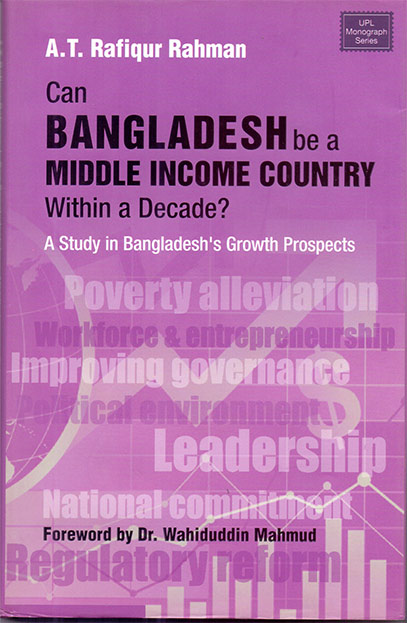- Shop
- Can Bangladesh be a Middle Income Country within a Decade?: A Study in Bangladesh's Growth Prospects
Can Bangladesh be a Middle Income Country within a Decade?: A Study in Bangladesh's Growth Prospects
https://uplbooks.com/shop/9789845061087-can-bangladesh-be-a-middle-income-country-within-a-decade-a-study-in-bangladesh-s-growth-prospects-8328 https://uplbooks.com/web/image/product.template/8328/image_1920?unique=3d813f3
| Language: English |
Tags :
Book Info
Bangladesh, a low income country, has lately been successful in accelerating the rate of economic growth. There is a special significance for Bangladesh to make the transition to the middle income country (MIC) status. Not only does it imply that Bangladesh can sustain and perhaps escalate the growth rate and thus, can achieve “growth-mediated” development with active public policies, but it also strengthens self-confidence and elicits recognition and respect from other countries and institutions. After examining the trend of recent growth in the Bangladesh economy and also the experience of ten low income countries for the ten years prior to their recent promotion to the MIC status, the author concludes with a well-studied conviction that the country will become a MIC by 2021, if not earlier.The monograph encapsulates the ideas of a profound and deeply concerned social thinker. He points to the dynamism of the country’s private sector and the capabilities of its workforce. He believes that promoting Bangladesh to an MIC is a pragmatic and constructive way of improving the country’s divisive political environment. The two major parties can have a common rallying banner adopting this as a “National Goal” with commitment towards human development, creative use of expatriates, and reforming regulatory processes.

A.T. Rafiqur Rahman
A. T. Rafiqur Rahman received his PhD. in political science from Duke University, USA, and spent fifty years in teaching in Dhaka University, Carleton University, Canada, City University of New York and managing development programs in Comilla Rural Development Academy, International Development Research Center, Canada and United Nations Secretariat, New York. He conceived and led three UN studies in Bangladesh in the 1990s on public administration sector, local governance, and human security, which were published and critically acclaimed. The author published many articles and books in his profession. His two latest books are: Bangladesh in the Mirror: An Outsider Perspective on a Struggling Democracy, and Bangladesh Election 2008 and Beyond, both published by UPL in 2006 and 2008



